Click on images to enlarge
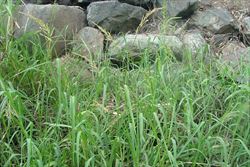
infestation (Photo: Sheldon Navie)
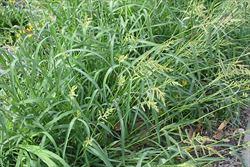
habit (Photo: Sheldon Navie)
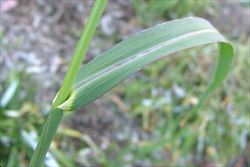
close-up of stem and base of leaf blade (Photo: Sheldon Navie)
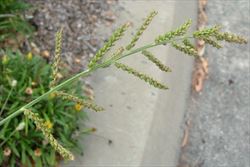
seed-head with awnless flower spikelets (Photo: Sheldon Navie)
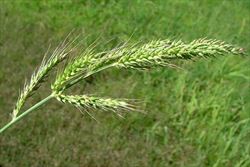
seed-head with awned flower spikelets (Photo: Sheldon Navie)
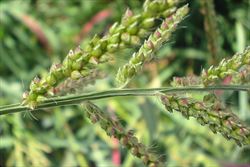
close-up of awnless flower spikelets (Photo: Sheldon Navie)

close-up of awned flower-spikelets (Photo: Sheldon Navie)

mature seed-head with seeds (Photo: Sheldon Navie)

close-up of awnless seeds (Photo: Sheldon Navie)
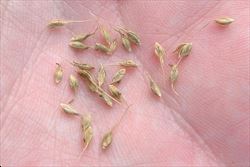
close-up of awned seeds (Photo: Sheldon Navie)
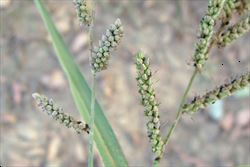
comparison of the seed-heads of awnless barnyard grass (Echinochloa colona), without bristles on the left, and barnyard grass (Echinochloa crus-galli), with bristles on the right (Photo: Sheldon Navie)
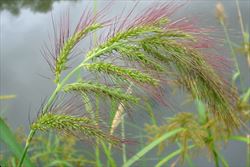
the similar native plant known as swamp barnyard grass (Echinochloa telmatophila), with longer reddish-coloured awns (Photo: Sheldon Navie)
Scientific Name
Echinochloa crus-galli (L.) P. Beauv.
Synonyms
Echinochloa crus-galli (L.) P. Beauv. subsp. hispidula (Retz.) HondaPanicum crus-galli L.
Family
Gramineae (South Australia)Poaceae (Queensland, New South Wales, the ACT, Victoria, Tasmania, Western Australia and the Northern Territory)
Common Names
barnyard grass, barnyard millet, barnyardgrass, billion dollar grass, California watergrass, chicken panic, cocksfoot panicum, cockspur grass, cockspur, Japanese millet, panicgrass, watergrass
Origin
This species is present throughout the tropical, sub-tropical and warmer temperate regions of the world. Its exact origin is obscure, but it is thought to be native to parts of Europe and Asia.
Naturalised Distribution
Widely naturalised throughout most of Australia (i.e. in Queensland, New South Wales, Victoria, the ACT, Tasmania, South Australia, the southern and north-western parts of the Northern Territory and south-western Western Australia), and particularly common in the eastern and southern parts of the country.
Also naturalised on Lord Howe Island, on Norfolk Island and in many other parts of the world.
Notes
This species is a weed of waterways, swamps, wetlands and other damp habitats as well as crops, roadsides, disturbed sites and waste areas. It is regarded as an environmental weed in Queensland, New South Wales and Victoria. In south-eastern Queensland it is ranked among the top 200 most invasive plant species. It also appears on several local and regional environmental weed lists in New South Wales (i.e. in the wider Sydney and Blue Mountains region) and Victoria (i.e. in the Goulburn Broken Catchment and in Knox).
Common barnyard grass (Echinochloa crus-galli) is generally of concern as an environmental weed in wetter habitats, and it is considered to be one of the principal weed species affecting freshwater wetlands in eastern Australia. For example, it is a common weed of freshwater wetlands on coastal floodplains in New South Wales, a plant community that is regarded as being endangered in this state. It is also present in wetter sites in arid regions (e.g. in Kinchega National Park in south-western New South Wales).

